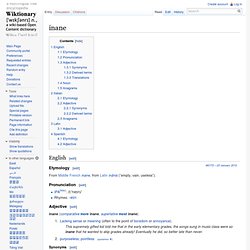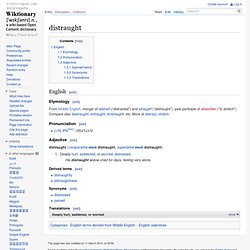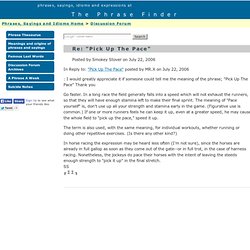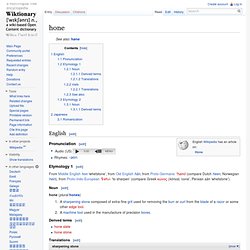

Flashpoint. Www.merriam-webster.com/dictionary/lane. Tattered. Desultory. Inane. English[edit] Etymology[edit] From Middle French inane, from Latin inānis (“empty, vain, useless”).

Pronunciation[edit] IPA(key): /ɪˈneɪn/Rhymes: -eɪn Adjective[edit] inane (comparative more inane, superlative most inane) Synonyms[edit] (lacking sense): silly, fatuous, vapid. Distraught. English[edit] Etymology[edit] From Middle English, merger of distract (“distracted”) and straught (“distraught”), past participle of strecchen (“to stretch”).

Compare also bestraught, extraught, forstraught, etc. More at distract, stretch. Pronunciation[edit] (UK) IPA(key): /dɪsˈtɹɔːt/ Adjective[edit] distraught (comparative more distraught, superlative most distraught) Deeply hurt, saddened, or worried; distressed. Diehard. English[edit] Alternative forms[edit] die-hard Etymology[edit] From the idiom "to die hard".

Adjective[edit] diehard (comparative more diehard, superlative most diehard) Synonyms[edit] See also Wikisaurus:obstinate. Quip. "Pick Up The Pace" Posted by Smokey Stover on July 22, 2006 In Reply to: "Pick Up The Pace" posted by MR.X on July 22, 2006 : I would greatly appreciate it if someone could tell me the meaning of the phrase; "Pick Up The Pace" Thank you Go faster.

In a long race the field generally falls into a speed which will not exhaust the runners, so that they will have enough stamina left to make their final sprint. The meaning of "Pace yourself" is, don't use up all your strength and stamina early in the game. The term is also used, with the same meaning, for individual workouts, whether running or doing other repetitive exercises. In horse racing the expression may be heard less often (I'm not sure), since the horses are already in full gallop as soon as they come out of the gate--or in full trot, in the case of harness racing. Hone. English[edit] Pronunciation[edit] Rhymes: -əʊn Etymology 1[edit] From Middle English hon ‘whetstone’, from Old English hān, from Proto-Germanic *hainō (compare Dutch heen, Norwegian hein), from Proto-Indo-European *ḱeh₃i- ‘to sharpen’ (compare Greek κώνος (kónos) ‘cone’, Persian sān ‘whetstone’).

Noun[edit] hone (plural hones) A sharpening stone composed of extra-fine grit used for removing the burr or curl from the blade of a razor or some other edge tool.A machine tool used in the manufacture of precision bores.